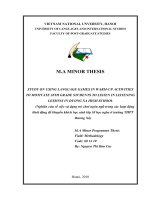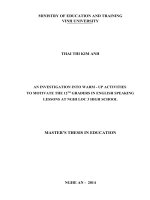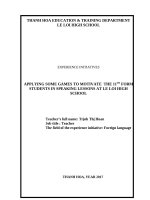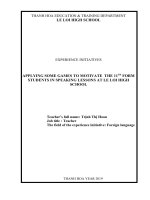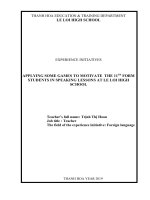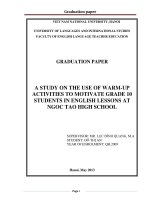Skkn some effective warm up activities to motivate 11th grade students in learning english at nghi son high school
Bạn đang xem bản rút gọn của tài liệu. Xem và tải ngay bản đầy đủ của tài liệu tại đây (1.74 MB, 29 trang )
THANH HOA DEPARTMENT OF EDUCATION AND TRAINING
NGHI SON LOWER AND UPPER SECONDARY SCHOOL
-----------------------------------------------
INNOVATION
SOME EFFECTIVE WARM UP ACTIVITIES TO MOTIVATE
11th GRADE STUDENTS IN LEARNING ENGLISH AT NGHI
SƠN HIGH SCHOOL
Written by: Trinh Thi Thu Hoai
Function: Teacher
Subject: English
THANH HÓA NĂM 2022
skkn
TABLE OF CONTENTS
Pages
1. INTRODUCTION
1
1. Rationale and context of the study
1
2. Aims of the study
2
3. Scope of the study
2
4. Methods of the study
2
2. CONTENT OF THE STUDY
2
2.1. Theoretical background
2
2.1.1. Definition
2
2.1.2. The importance of warm-up
3
2.1.3. Useful strategies when implementing warming up activities
3
2.2 Reality
4
2.2.1 To the teachers
4
2.2.2 To the students
5
2.3. Solution to the problems
6
2.4. Effect of innovation
15
3. CONCLUSION AND RECOMMENDATION
16
3.1. Conclusion
16
3.2. Recommendation
17
skkn
1. INTRODUCTION
1.1. Rationale and context of the study
It is undeniable that English language plays a crucial role in our lives as it
helps in communication. It is supposed to be the main language for studying any
subject all over the world. English is critical for students as it broadens their minds,
develops emotional skills, improve the quality of life by providing job
opportunities. Additionally, the use of English as an International language is
becoming popular with time because it is the only means for communication in
many countries. Therefore, learning and teaching English as a second language is
paid more and more attention.
Over the last two decades, the needs for English language ability in
Vietnam have significantly changed with the rapidly increasing demands of
globalization in many fields such as the environment, economy and culture. English
has been regarded as an essential foreign language, especially for the Vietnamese
young generation. Particularly, it is compulsory in the curriculum of almost all
schools and universities. Awkwardly, the concern of students in English is not the
same as how well they realize the crucial role of being good at English. Students
seem reluctant to learn English as a required discipline in their school. The reasons
for the ignorance to English of students were originated from inadequate learning
condition and traditional teaching methods.
It is believed that an ESL class will not be successful if the students do not
feel interested at the very beginning of a class. Hence, a teacher is always supposed
to start a lesson in a way which keeps his or her students engaged. Accordingly,
many different types of warm-up activities such as songs, games and discussion
questions can be used to catch students’ attention in class. Many researchers state
that to improve students’ learning and to get the best from them, it is a must to start
a class with a good warm-up session.
In addition, many school children complain that they feel bored doing same
thing again and again from the beginning to end of a class. As they do not feel
involved in class, they cannot progress much in learning a language. Unluckily,
many teachers do not pay attention whether students feel interested and motivated
to work with the activities they provide in classes. It is needed to find out how to
keep students’ interest in learning. Using warm up activities can be one useful way
to bring difference in class activity and to make the students curious, focus their
attention, provide them purpose and motivation. This helps to create positivity
around the lesson, motivate students with their participation and creating a positive
attitude towards learning. Games can also create a positive memory and experience
of learning for students in the classroom.
All the above reasons and factors have inspired the author to choose the
study entitled “Some effective warm up activities to motivate 11 th grade
1
skkn
students in learning English at Nghi Son high school”. Hopefully, the study may
result in some benefits for English learners as well as English teachers.
1.2. Aims of the study
This study has been carried out with an aim to raise both teachers and
students’ awareness of the importance of warm up activities at Nghi Sơn lower and
upper secondary school. It is hoped that the findings from this study could arouse
learners’ interest and enable them to select and use games for warmups which are
suitable for them.
The researcher is interested to know whether and how often warm up activity
is used in 11 grades. Also, the study attempts to find out how effectively warm up
is used in the above the mentioned classes.
1.3. Scope of the study
The research was conducted among the 11th grade students of three classes
(11A1, 11A5, 11A6) at Nghi Son Lower and Upper Secondary School. The
implementation took place in accademic year 2021-2022 and was determinedly
observed, reviewed and evaluated by the teacher researchers.
1.4. Methods of the study
To carried out the study, the following methods and procedures were
employed:
-
Investigating methods
Analytic and synthetic methods
Comparative and contrastive methods
Observating methods
Firstly, the writer reviewed the theories related to the matter in concern in
order to shade up a framework for the analysis and then collected information
asociated with the warm-up activities from different sources: refernces, internet and
books. Secondaly, the author created on the observation to realize the problem in
teaching and learning English. Then, the instructor applied all the practices in
teaching warm up and examine the results after that.
2. CONTENT OF THE STUDY
2.1. Theoretical background
2.1.1. Definition
In terms of definition, a warm-up stage is a preliminary stage which helps the
students feel relaxed and sets a positive mood for learning (Wikipedia). According
to Robertson (2000) “warm up is a short activity for the beginning of lesson” [1]. He
claims that warmups are different types of activities which help the students begin
to think in English, review previously introduced materials and become interested
in the lesson. So, a warm-up activity is used to start a class with an interesting task
1
The concept of warm up, author is based on reference []
2
skkn
to help the students be comfortable in classroom setting and to help them start
thinking in English.
Hoang (2000) additionally has defined the main characteristics of a warm-up
activity [2]. He comprises that a warm-up activity needs to be fascinating to
motivate the students for performing English. It will not be the main part of the
lesson as a warm-up activity is a short activity. Warm up can be used to give the
students a chance to revise previously studied language. It is commonly agreed that
warm up activity must be related with the lesson topic. He mentions that it is not
necessary that warm-up activity be connected to the lesson as the main purpose of
using warm-up activity is making the students ready to work in English.
Smith (2008) suggests some principles to design a warm-up activity [3]. He
suggests that a warm-up activity should take place at the beginning of the class. It
will help the teachers catch the students’ attention. It must be interesting so that
students get motivated from the very beginning. It is usually a short activity as it is
a preparatory stage of other stages of a lesson. Warm up activity must be related
with the lesson topic so that in other stages students can get involved in different
activities easily to develop their language skill. Following is the diagram that
displays some of the principles of warm up activity taken from Smith (2008) [3]
2.1.2. The importance of warm-up activities
The importance of having warming up activities was mentioned at the
beginning of this paper, but a question remains: What is a warming up activity?
Many researchers considers that warm up activities are designed to attract students'
attention, to help them put aside distracting thoughts, and to get them ready to
focus individually and as groups on whatever activities that follow. They will cause
people to stop whatever they are doing or thinking and refocus their attention. We
could say a warming up activity is a motivating starting point that will lead students
to become animated to work efficiently in the language class. For the purpose of
the study, it was the activity used to encourage students' involvement and permeate
the development of the whole lesson, so we avoided looking at them as isolated
activities. These kinds of activities might also be called zealous, enthusiastic or
suggestive activities. How these activities can be included in the process of a class
will be the next focus in our discussion.
2.1.3. Useful strategies when implementing warming up activities
For the purpose of the project, the writer considered some specific aspects
related to warm up activities which could make students' learning more stimulating.
They were as follows:
- Breaking the monotony of learning
- Making the tasks more interesting
- Increasing the involvement of the students
2
The principles of warm up, author is based on reference []
3
The principles of warm up, author is based on reference []
3
skkn
Diagram 1 shows some of the principles that a teacher must consider when
preparing a warm-up activity. It emerged as a result of our reflections upon our
conceptual framework and the implementation process we designed.
Diagram 1: features of warm-up activity
The principles contained in this diagram make us realize that warm up
activities are not only processes to begin the class, but tools that help us catch
students' attention. If you start with an exciting and interesting activity you can be
sure the other steps can be developed easily. This warm-up must also be short
because it is like a preparation for the other class stages. That is why it must be
related with the topic and centered in communicative aspects which could involve
activities that emphasize the practice of different skills.
Learning English highly depends on pupils' positive attitude toward the class.
Consequently, learning must be stimulating and enjoyable through breaking what
might cause monotony in this process and strengthening what makes tasks more
interesting, as well as what increases students' involvement. The use of warming up
activities implies features as the ones previously described to get students'
attention, to make them interested in what is going on, to focus on language items
and to increase learners' expectations by consciously arranging the conditions in a
way that they put the learner in a more positive or optimistic mood
2.2. Reality
4
skkn
2.2.1. To the students
In general, the Vietnamese students’ ability to use English is still weak; most
students can study English at university, but the ability to speak it with foreigners
seems impossible for most students if they are not majoring in the English
language.
The English level of graduates has not met the needs of the job. Most
students can read and understand some documents, but many of them cannot
communicate, write, and speak well. The English proficiency of most students does
not meet the requirements. The testing forms are somewhat different but reflect the
general picture of ineffective teaching and learning of English in the education
system in Vietnam. These problems have resulted from the following reasons:
First and foremost, in Vietnam, the results of teaching and studying English
is evaluated in grammar and reading comprehension. Therefore, the whole
education system has not really invested effectively to teach this language focusing
on important skills, such as listening, speaking and writing. Besides, teachers of
English seem only to take the test, so they do not invest in other skills, especially
listening and speaking. Even, many teachers in the schools cannot speak fluently
with foreigners in English. These causes also influence the quality of English
teachers which may affect learners’ abilities. Also, class sizes in Vietnam are large
(often over 30 students per class), and there is no assistive technology, so it is
difficult to teach language skills effectively. Passive students mainly learn to get
points for passing English subjects, not to use practical language skills. Thus,
teachers do not have the motivation to improve their qualifications and teaching
methods.
2.2.2. To the teachers
Regarding teachers, some people believe that warm up is useful and needed
for learning to be fun. They basically use it in the first class of a new course to give
the students a chance to be familiar with each other. They ignore the other benefits
of using a warm-up activity in classroom. For example: it can motivate the students
to participate in class activities, activate the students’ background knowledge, help
the teachers introduce a new topic in interesting way or help get the students’
attention. However, teachers use common techniques such as questioning,
reviewing materials from the previous class, chatting with students as warm up
activity whereas they can use jokes, songs, funny videos, games, stories, or pictures
to make the class more interesting. On the first day of the survey, a survey was
delivered to the teachers to make sense of their awareness of the importance of
warm up activities in the classroom.
+ Teachers’ attitude toward the importance of warm up activities at
ESL classrooms.
5
skkn
7
6
5
4
3
2
1
0
More important
Equally important
Less important
Chart 1: The importance of warm up activities
Moreover,11th grade students at Nghi Son Lower and Upper Secondary
School are quite bad at English. They often feel bored during lesson, hence, they
have no motivation to acquire language. Consequently, the results of English tests
are not highly expected. Consequently, teachers are supposed to give some
strategies to stimulate the students’ interest, and warm up is among the most
effective ways.
2.3. Solutions to the problems
Beginning a class with a warm-up activity is a good way to grow curiosity
and interest among the learners and motivate them to give their attention in further
activities to know more. Teachers can use the following games to warm up the
lessons in five or seven minutes.
a. Using video and songs
Short videos increase student engagement, which in turn helps boost
achievement. If students are interested in the material, they will process and
remember it better. They offer the flexibility to pause, rewind, or skip throughout
the video to have class discussions or review particular areas. This is an excellent
way for students to familiarize with the topic. Teachers can make use of YouTube
sources for songs and short clips.
For example, unit 4: volunteer work, teachers can show a video and ask
students some questions:
- What are the people doing?
- How meaningful is volunteer work?
- How often do you involve in volunteer work?
Afterwards, students may be led to the lesson officially.
6
skkn
/>
[5]
The song about renewable energy is used in unit 11: Sources of energy.
4
Example, the link is on the reference []
5
Example, the link is on the reference []
7
skkn
b. Hot Chair Game
This is a very lively activity and can be adapted to different class sizes. It is
also excellent for revising vocabulary.
- First, split your class into different teams.
- Sit the students facing the board.
- Then take an empty chair - one for each team - and put it at the front of the
class, facing the team members. These chairs are the 'hot seats'.
- Then get one member from each team to come up and sit in that chair, so they
are facing their team-mates and have their back to the board.
- As the teacher, have a list of vocabulary items that you want to use in this
game.
- Take the first word from that list and write it clearly on the board.
- The aim of the game is for the students in the teams to describe that word,
using synonyms, antonyms, definitions etc. to their teammate who is in the hot
seat - that person cannot see the word.
- The student in the hot seat listens to their teammates and tries to guess the
word.
- The first hot seat student to say the word wins a point for their team.
- Then change the students over, with a new member of each team taking their
place in their team's hot seat.
- Then write the next word…
One student from each team comes up and sits in the chair.
8
skkn
The teacher then writes a word or phrase on the board.
For example, Unit 12 Asian Games, teachers can write some words related
to sports: volleyball, soccer, basketball, cycling, football, aquatic sports, athletics
and weightlifting…
The students are then given 30 seconds to try and explain the target word on
the board to their team member. They must not say the target word or any other
word in the phrase, they cannot use body language to help, nor can they use
rhyming words.
The first person sitting in the chairs to guess the word or phrase wins a point
for their team.
9
skkn
c. Using pictures or flashcards in guessing word game
In teaching and learning procedure, the role of using pictures as media has
become the best choice in teaching English especially in warm up activities.
Pictures are important to help the students in learning English.
It is said that visual have an important function as aids to learning simply
because they attract student’s attention and help encourage them to focus on the
subject in hand. Pictures can play a key role in motivating students contextualizing
the language they are using, giving them a reference and helping to discipline the
activity. Here are some benefits of using pictures in teaching languages:
Pictures can motivate students and make him or her want to pay attention
and take apart.
Pictures contribute to the context in which language is being used.
Pictures can be described in an objective way or interpreted or responded
subjectively.
Pictures can cue responses to questions or cue substitutions through
controlled practice.
Pictures can stimulate and provide information to be referred to in
conversation, discussion, and storytelling.
For example, unit 16: the wonders of the world, teachers can use some pictures of
some wonders of the world and ask questions:
- Where is it?
- What do you know about it?
And then teachers lead students to the topic interestingly.
10
skkn
11
skkn
d. Crossword games
Crossword puzzles, which are mainly focused on vocabulary and spelling
practice. Crossword puzzle can improve the students’ vocabulary by filling the
words in the clues and reading the clues of crossword puzzle. Sometimes, the
teacher gives the clues of crossword puzzle orally, so the students listen and write
down the clues. It can train the students’ spelling and listening.
Teacher should divide class into small groups for students to do warm up in
five or seven minutes. Which group has the right answers most quickly will be the
winner.
For example, unit 13: Hobbies. Teachers can deliver some handouts to the
students about hobby vocabulary and then lead them to the topic of the lesson.
12
skkn
e. Free- time Mime (used for warmup of unit 13: Hobbies)
Here is a fun hobby miming and true or false game to help students practice
vocabulary related to hobbies and free-time activities.
First, students take it in turns to pick up a card and mime the hobby or freetime activity on the card for the other students to guess. The first student to
correctly guess the hobby or free-time activity wins and keeps the card. The student
with the most cards at the end of the game is the winner.
13
skkn
Afterwards, students play a true or false game using the cards. Students take
it in turns to pick up a card and make a personal statement about the hobby or freetime activity on the card, e.g. 'I love listening to music in the car'. The other
students in the group then ask the student questions to determine if he or she is
lying or telling the truth. The students then each guess whether the statement is true
or false and the answer is revealed. Students score one point for each correct guess.
The student with the most points at the end of the game wins.
14
skkn
2.4. Effect of innovation
To conclude, using warm up activity can be an effective way to start a class
with an interesting activity, to help the students set a positive mood for learning and
to keep them engaged in class. The study result has shown that in a language
classroom warm up activity can be used for many purposes. One of the reasons of
using warm up is to establish a good relationship between students and teachers and
to set a positive learning environment for the students to make them comfortable in
classroom. Then, warm up can be used to motivate the students so that they become
interested to learn. Moreover, teachers can use warm up to get students’ attention at
the beginning of the class. Also, the use of warm up also can be a good exercise for
the students to recall their background knowledge. Besides, teachers can discuss the
lesson objectives in the warm-up session so that students get a clear goal to give
higher effort to learn.
We can look at the following table to make comparison the result of the test
before and after applying the method.
The result of the students before the application of the new method.
Good achievement
Class
Not
achievement
Credit
Total
SL
TL
SL
TL
SL
TL
11A1
39
15
38.5%
5
12.8%
19
48.7%
11A5
38
0
0%
20
52.7%
18
47.3%
11A6
40
0
0%
22
55%
18
45%
The result of the students after the application of the new method.
Good achievement
Class
11A1
Not
achievement
Credit
Total
39
SL
TL
SL
TL
SL
TL
17
43.6%
18
46.2%
4
10.2%
15
skkn
11A5
38
7
18.4%
25
65.8%
6
15.8%
11A6
40
8
20%
25
62.5%
7
17.5%
Based on the result of the test, we can see that the number of students getting
credit and good achievement is much higher than that of the first test. And the
percentage of students not achieving is lower at about 10 percent. Hence, the
method is effective for students in general.
In addition, the data were obtained from the distribution of the questionnaire
to the students. It was designed to help the writer to get more information about
students‟ responses toward the implementation of the method. the data obtained
can be seen in the following tables and description:
ANSWER
STUDENTS
PERCENTAGE
Strongly agree
80
80%
Agree
20
20%
Disagree
0
0
Strongly disagree
0
0
100
100%
Total
Table 1: Warm-up activities encourages students to be more confident and ready
to participate into many classroom activities.
This table shows that 80 students (80%) strongly agree that the method helps
students to be more active in the class and 20 students (20%) agree with the
statement. On the other hand, none of them disagree or strongly disagree with the
statement. So, all of students believed that word wall platform enhances their
ability to memorize vocabulary better. Moreover, based on the writer’s observation,
they enjoyed English lesson more.
In the study, it was revealed that with the web, both students and teachers
could easily share the contents they designed during the teaching process. Pointing
out that the platform is a user-friendly application, it is stated that many materials
can be easily accessed, content is developed, and content can be shared. In addition,
the advantage that the prepared materials can be stored and used again and again
when needed stands out. It has been found in this study that the web offers the
opportunity to be used as a measurement tool in the teaching process and to be
16
skkn
effective in evaluating the student. It has also been emphasized that quizzes can be
made on the subject. Hence, it creates an interesting learning environment.
Especially in the online education process, the distance between the teacher and the
learner makes this opportunity even more valuable. In addition, these tools are
economical, strengthen the communication network with students, and easy file
sharing with students can be seen as other opportunities.
3. CONCLUSION AND RECOMMENDATION
3.1. CONCLUSION
Based on the outcome of the research, it is concluded that the new
methodology of using warm up activities has a positive impact toward students’
learning ability. The result of the data analysis suggested that the students’ ability
in terms of using language has increased from the pretest to posttest. The result of
posttest in experimental class was higher than in control class. The mean score of
the students in experimental class is also higher than before.
The strategies made students more energetic and creative in shared their
ideas by using warm-ups. It revealed that the treatment by the strategies has a
beneficial effect for students’ interest in learning English.
3.2. RECOMMENDATION
The researcher gave some suggestions were as follow:
While warm up activity has lot of benefits, many teachers neglect it to use.
Instead of directly starting the class with the main activity, teacher can use warm up
activity to make the class interesting. The students do not give attention in class
when they find it boring. Warm up activity can bring variety in class and hold the
students’ attention.
Teachers in observed classes reviewed previous class lesson, chatted with the
students in informal tone, elicited information through questioning etc as warm up
activity. There are different things like jokes, games, puzzles, songs, video clips
which can be used as warm up activity. Teachers can use jokes, games, puzzles,
songs or video clips to bring a change in classroom environment.
Students can get a chance to communicate and share their ideas with each other in
warm up session on those classes where teachers provide them individual work and
students do not have any option to interact with each other.
It is necessary to tell the students why they are doing certain tasks. A warm
up session can be a good time to discuss the lesson objective so that students get a
valid reason to perform any activity.
17
skkn
Nghi Son, April, 20th, 2022
Confirmation of the principal
I certify that this research paper is the result
of my own study.
Author
Trinh Thi Thu Hoai
18
skkn
REFERENCES
[1]. Robertson (2000), Second Language Learning Theories, New York: Oxford
University Press.
[2]. Hoang (2000). Teaching English to children. Hanoi National University
[3]. Smith (2008), Teaching languages to young learners, Cambridge: Cambridge
University Press.
[4]. />[5]. />Vietnamese:
Hoàng Văn Vân. (Ed.). (2009). Tiếng Anh 11. Hà Nội: Nhà Xuất Bản Giáo Dục.
Teacher’s book, textbooks written by the Ministry of Education.
19
skkn
APENDIX
HOBBIES & FREE TIME ACTIVITIES 1
Write the names under the correct pictures
1.
2.
5.
6.
9.
10.
13.
14.
17.
18.
21.
22.
CANOEING
FOOTBALL
JUGGLING
GARDENING
YOGA
SKATING
BINDING
TABLE TENNIS
SKIING
SAILING
DIVING
JOGGING
PHOTOGRAPHY
POTTERY
BOWLING
WEIGHTLIFTING
FENCING
COOKING
READING
CARDS
BADMINTON
SEWING
PARACHUTING
DARTS
HANG GLIDING
KNITTING
CYCLING
FISHING
CAMPING
SWIMMING
BILLIARDS
PAINTING
3.
4.
7.
8.
11.
12.
15.
16.
19.
20.
23.
24.
20
skkn
25.
26.
27.
28.
29.
30.
31.
32.
KEY:
1. BADMINTON
2. PHOTOGRAPHY
3. GARDENING
4. KNITTING
5. SKATING
6. CAMPING
7. SAILING
8. FOOTBALL
9. PAINTING
10. DIVING
11. HANG GLIDING
12. POTTERY
13. BINDING
14. FENCING
15. CANOEING
16. BILLIARDS
17. SEWING
18. BOWLING
19. DARTS
20. FISHING
21. CYCLING
22. READING
23. JUGGLING
24. SKIING
25. WEIGHT LIFTING
26. JOGGING
27. PARACHUTING
28. COOKING
29. CARDS
30. SWIMMING
31. TABLE TENNIS
32. YOGA
21
skkn
UNIT 4: VOLUNTEER WORK
22
skkn
UNIT 11: CELEBRATIONS
23
skkn
